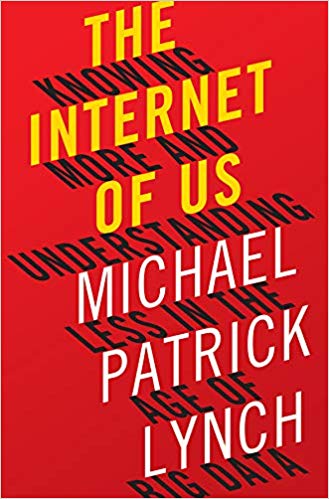You have /5 articles left.
Sign up for a free account or log in.
 The Internet of Us: Knowing More and Understanding Less in the Age of Big Data by Michael P. Lynch
The Internet of Us: Knowing More and Understanding Less in the Age of Big Data by Michael P. Lynch
Published in March of 2016.
Good morning.
I have the honor of introducing the next speaker for our conference, an event in which we are wrestling with the question of "Is Digital Technology Making Us Smarter?”
Dr. Michael Lynch is here to speak to us about his recent book The Internet of Us: Knowing More and Understanding Less in the Age of Big Data.
[Blogger’s Note: Pretend you are in attendance this Saturday morning at the conference. I’m using this blog space to write my introductory remarks, and as an opportunity to get double bang for the buck (a book review and an introduction) from reading Michael’s fantastic book.]
Before I say a few words to introduce Dr. Lynch, I’d like to make a quick pitch. If you have not yet read The Internet of Us, you should.
When professor Murphy asked me to introduce professor Lynch and serve as commentator for his talk, I went right to Amazon and grabbed the book.
Thankfully, and maybe even perhaps ironically for a conference and a book about the impact of digital platforms on knowledge, The Internet of Us is available in every digital form. I purchased the Kindle e-book and the Audible audiobook.
So my connection with professor Lynch and his thinking is already deeply digital.
In The Internet of Us professor Lynch takes head-on the question of why anyone would ever pay so much for a college education in a world of instantaneous access to digital information.
In a world where “Google-knowing” (Michael’s terms) has become a new form of knowledge, what is the point of college?
Professor Lynch takes this question a step further, pointing out that the next evolution of the internet will migrate from smartphones to wearables - with the inevitable move from Google spectacles to Google contact lenses to Google brain implants.
The way Dr. Lynch phrases the question is “Why go to college if you have neuromedia?”
I want to read you what Dr. Lynch wrote to answer this question in The Internet of Us, as I think that it is one of the most beautiful and economical arguments for a liberal arts education that I’ve come across.
Professor Lynch writes:
"...we go to college to find pilots who can guide us across the vast seas of knowledge. We need them to tell us what is already charted and what is left to chart still. Such guides shouldn’t make us more receptive knowers; they should aim to make us more reflective, reasonable ones and, what’s more, they should help us to understand.” (Page 154)
I don’t want to steal anything else that Dr. Lynch may be telling us - so I will not say more about The Internet of Us.
What I will do is introduce him.
Dr. Lynch is a professor at the University of Connecticut.
He is a philosopher.
Professor Lynch’s TED Talk from The Internet of Us - which I also watched and recommend to all of you - has been viewed almost 1.7 million times.
Dr. Lynch is the principal investigator in a multi-million dollar project Humility & Conviction in Public Life, supported by the Templeton Foundation. This project is hosted University of Connecticut Humanities Institute, which Michael directs.
Professor Lynch is the author something like 6 previous books prior to publishing The Internet of Us, 5 of which have some form of the word “Truth” in their titles.
His upcoming book Know-It-All Society: Truth and Arrogance in Political Culture, will be published this summer.
Please welcome Dr. Michael Lynch.
______
[Another blogger's note]:
As I’m also the commentator for this session, I get to ask Dr. Lynch the first question or two in the Q&A portion. (Although I’ll probably invite the audience to have the first crack).
If I do get to ask a question, what do you think that I should ask?
Here is what I’m thinking about asking:
Q1: You wrote your book came out a few months before the 2016 election - correct? If I had read your book in March of 2016, I might not have been so surprised in November of that year. It is hard not to read your book in light of the Facebook revelations and our transition into a world of “alternative facts.” How has your thinking evolved given everything that has happened over the past couple of years?
Q2: The internet seems like it has changed everything. But the world of residential higher education sort of looks the same as it did when I was in college before the first Web browser. What do you think the traditional residential university might look like 30 years from now? Will it even exist? Will it be no different from today as today is from 1989?




